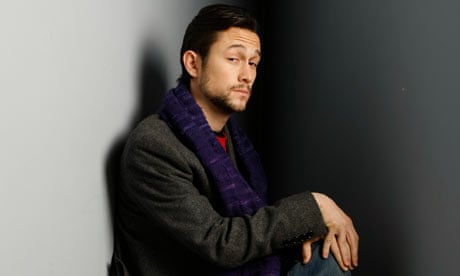Joseph Gordon-Levitt's eyes don't feature on the poster for (500) Days of Summer. Hair? Yes, carefully tousled into an emo mop. Stubble? Check, though more dappled than grizzled, in keeping with the genre – 500 Days is a whimsical romcom for the Wii generation. Lush eyelashes are especially well showcased. But the only clue to his mood, as he peers down at a T-shirt featuring stills from the film, is his smile: rueful, demure – an embarrassment of dimples. Face to face, it's a similar story: Gordon-Levitt has tiny eyes – dark dashes buried in big sockets that lend him an odd look of permanent upset, as if, not so long ago, he might have been crying. Add to that jet-black slicked-back hair and a slightly Boris Karloff bone structure and you've got quite an intimidating prospect. Lips up, at least.
This isn't just teenybop anatomising. Gordon-Levitt's eyes and mouth are crucial. His early career was all about the latter: he grinned his way through 66 episodes of the aliens-on-Earth sitcom 3rd Rock From the Sun, was sunnily sweet in ads for Pop Tarts and Cocoa Puffs ("Mmm, it is chocolatey!"), in A River Runs Through It and in the doggie romp Beethoven.
Then, just before he went to Columbia University in 2001 (history, literature, French poetry) Gordon-Levitt shot a film that first made full use of those eyes: Maniac, a wobbly-camera, micro-budget drama set in a young offenders' institute. There was a similar focus and intensity to those movies he made post-college: Mysterious Skin, in which he played a traumatised gay hustler; Brick, a doomy high school noir; The Lookout, about a brain-damaged janitor; and the Iraq vet tragedy Stop-Loss. As its poster suggests, (500) Days of Summer – the chronology is shuffled for dramatic oomph – is different. It's funny. "It sure was nice to just go to work and have fun, to be flirty," says Gordon-Levitt. "The last few movies I did, the characters were in a lot of pain and struggle. But it helped because in fact this character does go through a bit of pain and I wanted to bring an emotional honesty to his heartbreak."
Indeed. As Tom, a greeting cards writer who falls for and subsequently loses flighty Summer (Zooey Deschanel), Gordon-Levitt concretises hopes he could be a great leading man. He's moving and amusing and immediately empathetic, far more the film's lynchpin than its apparent muse: Deschanel is so wide-eyed and emotionally vacant you suspect more anti-depressants than commitment phobia. He cheerleads enthusiastically for the film: he loves its sincerity (he dislikes the phrase "anti-romcom" for its suggestion of cynicism), its honesty ("The writers wrote this film for catharsis; most movies you can feel you're being sold something"), and its modernity. "I'm proud to be in a film that's not beholden to the norms of the genre. These are nuanced characters, they're not put into boxes. Even today, in our progressive times, in most movies that come out, the men have to have biceps and the women have to be thin or something."
Yes, I say, it's curious how a lot of his characters, even the bruisers, have had a touch of femininity about them. His smile slips slightly. I stutter on: you know, they're quite vulnerable. "Vulnerable? Sure, sure, sure – you said 'feminine'". Yes, a touch? Has no one ever suggested that before?
It appears not. There's some to-and-fro about whether women are more vulnerable then men. The nameless flunky by the door shifts in her chair a little. "Maybe you mean that I tend to be interested in movies that show what's going on underneath someone's facade?" Well, yes, that too. But there is something feminine about Gordon-Levitt's appeal – certainly about the character he plays in 500 Days. Tom has about as much control of his romantic life as Michael Cera's character in Juno. It's Tom who's on a dedicated quest to find his soul mate, Summer who prefers sex to nesting. He who overinterprets her every word. She who suggests they split up because they've been squabbling: "We've been like Sid and Nancy for months." He protests – he's hardly Sid Vicious. She's amazed he could misinterpret: it's she that's Sid. "Oh," he digests, "so I'm Nancy."
It's the sort of gag that might have turned up in 3rd Rock, an underrated sitcom if ever there was one. But however first-class a training the show no doubt was, the Big Giant Head (the alien bureaucrat behind the foursome's mission) must cast a shadow over a young career. No wonder Gordon-Levitt spent so many years swimming away from the mainstream. It worked, too: these days the name he's most commonly mentioned in the same breath as is Heath Ledger, whom he worked with on 10 Things I Hate About You, and whom he resembles; indeed, he's just finished shooting Dark Knight director Christopher Nolan's latest, Inception.
"I never intended to only do dark, serious things. I just wanted to do good stuff. And it's just a lot less common to find good stuff that also manages to be funny." Does he think there's still some snootiness about the genre? "There's an absolute prejudice that good movies are dramas and comedies are more dismissable. But I couldn't disagree more. I think a lot of the best movies are comedies and they're harder to make. Comedy takes a very specific technique, specific skills. Drama is different. Someone who's never acted before can give a great dramatic performance if they just forget the camera is there and be real and feel it. You can't with comedy. It's much more practised and precision-oriented."
Gordon-Levitt has been acting for about two decades, serious about it for all of them. "I hated doing commercials," he told an interviewer a couple of years ago. "It's embarrassing what they make little kids do in commercials." His parents met as socialist activists in California. In 1970 Jane Gordon ran for Congress, standing for the anti-Vietnam Peace and Freedom Party. His father, Dennis Levitt, was a radio news producer. Such a background has not left Gordon-Levitt feeling guilty about being an actor. He finds the suggestion a sad one. "I think the stories we tell and the way we tell them are far from trivial: this is one of the ways we all grow up and learn to make meaning of the world and learn how to be people. I know for me the movies I watch and the music I listen to and the books I read have a real impact on my life. It's easy to lose sight of that and just call it a business. And the people that are most guilty of that attitude are people who work in movies."
Why do people do that? To dodge the responsibility? "Precisely, because it's easier. Then they're not responsible for what they're doing."
An impulse not to follow suit is presumably what, last year, prompted him to make an online video entitled Politics Is Bullsh1t, a four-minute film that spliced old news footage with a voiceover explaining how he didn't care about politics until Barack Obama came on the scene. "I wanted to make something describing the way a lot of people, especially my age, feel – which is that there's no reason to get involved [in politics], or pay attention or vote." But it's not a personal take? "No, that's not how I felt. But I'm not in that video. I was playing a character. He's just a young American."
It's an admirable risk: unless you were briefed, I fear you would suspect that he really was that flippant. Rather, he's deeply excited about politics. When he speaks about the president, his eyes light up in a new way. "He impresses the hell out of me. What I love about him is that he communicates really well. He speaks and I respect and understand what he's saying." 500 Days, shot during the primaries, feels, he says, like a film that comes out of the age of Obama. "He speaks really sincerely and honestly, he's always humble and 500 Days is similar in that way – it's not a big flashy hum-dee of a movie."
I wonder if the similarities could be pushed yet further. Doesn't it make him nervous, the level of love people have for Obama? Won't the object of so much affection inevitably disappoint? He thinks, pleased by the parallel. "In a way it's tempting to project on to Obama that's he's some sort of great leader that will lead us into goodness. Which he never claimed to be. Tom definitely does project on to Summer that she's this goddess that will make his life meaningful. But what Obama is actually saying is: 'Look, I'm going to do my best; this is not about me. We have to do this together.' He can't change the world by himself. What he's done is say: 'Look what's happening – let's all get up and do something.'"
At the Sundance film festival earlier this year, where 500 Days was screening, Gordon-Levitt took questions from the audience in a bright orange Obama T-shirt. He was also at the festival to debut Sparks, a short adaptation of an Elmore Leonard story, his first film behind the camera. So, who'd be his model, as a director? "It's got to be Obama." Really? As a director? "Of course he's a director, he's exactly a director." He's smiling, but his eyes tell you: he's dead serious.
(500) Days of Summer is released 2 September.




